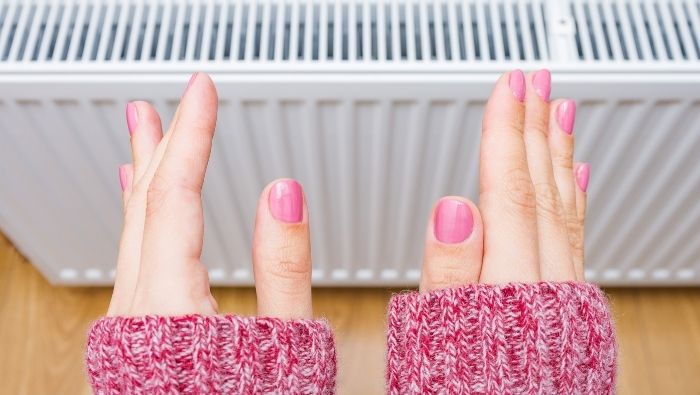10 Ways To Lower Heating Bills

Heating bills can burn a big hole in your budget when temperatures drop. Here are 10 ways to reduce the amount you spend on heat this winter.
According to the Environmental Protection Agency (EPA), heating accounts for around 30% of energy usage in the average American home. A properly maintained energy-efficient heating system combined with a few savvy household strategies can significantly reduce your home’s energy consumption.
Here are 10 tips to help lower your heating bill without compromising home comfort.
1. Weatherstrip.
Weather-stripping drafty windows and doors can knock up to 15 percent off your fuel and energy bills. A window that rattles in windy weather is a sure sign that warm air is leaking outside your home.
2. Seal leaks.
Any conduit that passes through your ceiling or an exterior wall, such as plumbing pipes and ventilation flues, can also be a source of leaks. Seal leaks to reduce your heating costs by an average of 11%.
Sign Up for Savings
Subscribe to get money-saving content by email that can help you stretch your dollars further.
Twice each week, you'll receive articles and tips that can help you free up and keep more of your hard-earned money, even on the tightest of budgets.
We respect your privacy. Unsubscribe at any time.
3. Take advantage of solar heat gain.
Leaving shades, curtains, and blinds open on south- and west-facing windows during the day allows solar radiation in. Sunlight helps raise the indoor temperatures of your home. Be sure to close them once the sun has set to retain interior heat.
4. Change or clean air filters.
A clogged heater filter impairs airflow, forcing your heating system to run longer to achieve a comfortable indoor temperature. The EPA recommends that homeowners replace or clean their air filters once monthly during the heating season or more often as needed.
5. Install a programmable thermostat.
These smart devices let you schedule your heater to lower household temperatures automatically when you’re asleep or away from home, reducing your heating bills by 10% or more. Most models have multiple settings for every day of the week.
6. Plant deciduous trees.
Trees that retain their leaves all year long shade your home during the cold season. Swap them out for deciduous trees, and your home will still get shade during the summer while allowing sunlight to filter through in the winter.
7. Change ceiling fan operation.
Ceiling fans are engineered to blow air either up or down at different speeds. In the winter, set the fan to spin clockwise at a slow speed. Keep in mind that ceiling fans consume energy as well. Installing an affordable motion detector switch will ensure that the fan only operates when someone is in the room.
8. Seal and insulate ductwork.
Over time, even well-designed and installed air duct systems are subject to developing leaks that substantially reduce the system’s energy efficiency.
According to the EPA, having the ductwork of your forced-air heating system sealed and insulated can reduce your heating expenses by as much as 30%. Because proper performance depends upon maintaining a careful balance between air delivery and air removal, however, experts recommend that sealing and insulation work be performed by qualified professionals.
9. Add space heaters.
If only heating one room, a space heater can be a more energy-efficient option than running your whole-home heating system. They’re also helpful in boosting the temperature for people sensitive to cold.
For protection against fire, remember to follow all safety recommendations when operating space heaters.
10. Maintain heating system.
Nothing drives up energy bills more than a neglected heater.
The EPA urges homeowners to have their heating systems serviced by a professional contractor at least once yearly. Enrolling in an HVAC inspection and maintenance program is the most economical and effective way to ensure safe and energy-efficient heating system operation.
Reviewed November 2023
About the Author
Shelly Duell is a blogger for Robert B. Payne, the air conditioning, heating and cooling experts servicing Fredericksburg, Stafford, King George and Spotsylvania County. The Company was formed in 1930 by Robert B. Payne, who, with a horse and buggy, started a business delivering wood and ice to local homes. Today he still services his community, but now with HVAC services.
Wouldn't you like to be a Stretcher too?
Subscribe to get our money-saving content twice per week by email and start living better for less.
We respect your privacy. Unsubscribe at any time.
Popular Articles
- 7 Habits of Highly Frugal People
- 5 Simple Budget Cuts That Can Save $200 a Month
- How to Track Down Unclaimed Funds Owed You
- 32 Ways to Save Money on Your Utility Bills
- Do You Need Credit Life Insurance When Buying a New Car?
- How to Maximize Profits When Selling Online
- Staying Motivated to Continue Digging Yourself Out of Debt
On After50Finances.com
- 9 Things You Need to Do Before You Retire
- You Didn’t Save Enough for Retirement and You’re 55+
- When Empty Nesters Reorganize and Declutter Their Home
- Reinventing Your Career in Your 50s or 60s
- What Mature Homeowners Should Know about Reverse Mortgages
- 2 Reasons to Collect Social Security Benefits As Soon As Possible

